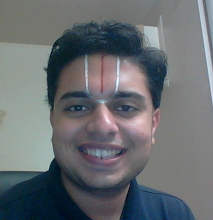
Atlast I have read Sivagamiyin Sabatham, a classic epic by Kalki, (unfairly) the second most popular, next to Ponniyin Selvan. It has been a good decision on my part to read Kalki's works in the order in which he wrote, though he wrote Parthiban Kanavu, the logical sequel to SS, first. I was waiting to read this for more than a year after finishing PK, and it was worth the wait that I finished this 4 part epic in 5 days (quite a toll).
I am not here to write a review, as no words by a silly me can do justice to this masterpiece - be it in the plot, or the characterisation, the narration, the description of the Kanchi town and the allied historical information, socio-religious-politics, perspectives, concious distortion of facts, conspiracy, espionage, bravery & fool-hardiness, gratitude and above all FAITH over which (both having and shaking from) the plot stands.
I was all but a front-bencher in a tamil cinema theatre, laughing, clapping, jumping but could not whistle :P. I so wanted to whistle in the Vajrabaahu episode(in the picture is the scene where Vajrabahu and Paranjothi meet), especially in the Malai kaNavai chapter where he tells Paranjothi about his promise to the kaNavai Durgaa devi.
It had almost all kinds of personalities - Epitome of Selfassurance: Chakravarthy Vichitrachittar Mahendravarman, height of loyalty: Chatrugnan and Gundotharan, Fickle minded and short tempered: Sivagami, Lack of Self-control: Aayanar, Mangayarkarasigal: Puvanamatha Devi and Vaanamaadevi, Tasteless Wild Beast: Pulikesi, Artistic-Sadistic-Cunning-Longshot thinker: Nagathanthi, Obedient Students: Kumara Chakravarthy and Pranjothi, Very ordinary mortals: Kannapiraan, Kamali, Kalipagai, ministers, etc...; All of them live through your thoughts even after you close the book.
One feels pity for Chakravarthy Mahendravarmar when he realises Garvabangam and that he was not Krishnaparamathma to get everything right and going his way. The character build up for the Hero of the novel was so profound and heavy that you would love to live in service to such an Emperor.
The best thing I got from this novel is the title of this post, which Chakravarthy Vichitrachittar Mahendravarmar states twice. I have always maintained this view point against the leftist jealousy over people who inherit high-position and wealth. All the legal heirs inherit only the responsibility and with the responsibility comes the luxury and unfortunately it is the luxury that attracts all the evil eyes.
And about the suspense factor that comes after having read Parthiban Kanavu is the villain in PK who comes from SS, I expected VishnuVardhan to be the one after having read the first three parts, and I was wrong.
There are ofcourse three major disappointments since I had some expectations from my side to begin with.
1) I expected a Vichitrachittar kind of a role to Chakravarthy Narasimhavarman in the last part, but he was potrayed only as an ordinary person with a lot of personal conflicts.
2) I expected Pulikesi to die in a wrestling duel (obvious expectation :P)
3) How dare Kalki spun an epic which had its heart at Kanchi without even a single mention about Atthigiri ? ! Grrrrrrrrrrrrrrrrrrrrr :x

2 comments:
I think your expectations are somewhat unrealistic.
1) At the end of SS, Narasimhavarman is still young revenge seeking person. He later grew up into a vichitrachittar kind of role in parthiban kanavu, when he had grown-up children.
2) Kalki always goes for unorthodox/unexpected endings. So the absence of a grand wresting dual it's not a surprise
3) I think Athigiri was built during the Chola period (11th century) and not during the Pallava reign. If you notice, there is not much talk about vaishnavism in SS unlike ponniyin selvan.
@ Karthik - Thanks for your thoughts.
1) PK begins a few months after Vatapi raid, and Sivanadiyar comes even in the opening battle. So I expected a smoother transition to begin with, but I accept the sudden transition too (bcos of the last scene).
2) I felt Pulikesi deserved an honourable death :-)
3) Even if one goes with Western rhetoric assigning modern era for mudhal aazhwars, Atthigiri should have existed even during SimhaVishnu's time; But probably was in a neglected state then.
I still haven't read PS, but I guess Chatrugnan-equiv will be the hero in that!
Post a Comment